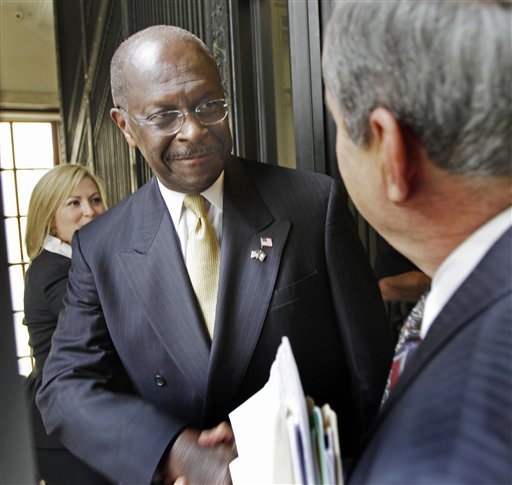There’s a lot to like about Republican presidential candidate Herman Cain.
He rose from poverty to become CEO of Godfather’s Pizza, a national chain. He has an engaging personality and is a charismatic speaker who holds little sympathy for those who say his experience as a member of a minority in America can’t be an inspiration for millions of others from all racial and ethnic backgrounds.
It’s no wonder that he has surged from the bottom of the pack to poll consistently among the leaders, ranking with Mitt Romney and Gov. Rick Perry as the party’s current favorites at the national level.
But he has made missteps along the way, including a comment that he would not look favorably on Muslims for Cabinet posts — a comment he later modified to only exclude “jihadists,” adding that most Muslims were “peaceful” and could be considered for such appointments.
THREE OF A KIND
What’s attracting attention now, however, is his “9-9-9” tax plan, which would impose a flat rate of 9 percent, with few or no exemptions, on corporate and individual income and (for the first time) national sales receipts.
The plan has the attraction of being simple and easy to understand, especially when the income tax code runs to several thousand pages and the vast majority of Americans has to pay other people to help them fill out their Form 1040s.
The complexity of the current system imposes huge costs on the economy. The nonpartisan Tax Foundation projects that Americans will spend $409.5 billion on income tax research and preparation in 2012 — none of which will be devoted to productive labor.
All of that makes flattening out the income tax — reducing the number of different rates while also trimming or eliminating the current variety of exemptions — a tempting idea that should be on everyone’s agenda for reform.
It would boost productivity by greatly simplifying and suppressing the economic distortion created by the subsidies the tax code now offers for a host of questionably valuable purposes.
But Cain’s 9-9-9 plan would work against that, first because, as economic analysis has shown, it would reduce by fully half the revenues now produced by the current code.
Thus there would be immense pressure to raise all the rates, and while he says he would block any increase as president, nothing in his proposal (unless it were imposed by constitutional amendment) would prevent it from becoming, say, 15-15-15 or 20-20-20 as soon as he left office.
Even worse, however, it would introduce for the first time a national sales tax similar to the “value-added tax” system found in many other industrialized nations.
The VAT levies taxes on products at each stage of production, and the reason it has been resisted here is that its increases are invisible to the end users — consumers — who still must pay all the taxes imposed at all levels of a product’s “added value” because they inevitably will be included in the product’s final price.
And because a national sales tax would be imposed along with the income tax, instead of in place of it, any ceiling on government’s ability to impose taxes across the board would be effectively removed.
Cain reportedly thinks his 9-9-9 plan could eventually be transformed into a form of the so-called “fair tax,” which is a national sales tax that would supplant other forms of federal taxation.
But to do that, it would have to be set at rates approaching 25 percent of a product’s price. Fair-tax backers say that poor people could be given rebates, but the process would be incredibly complicated, certainly as much as the current system.
Imagine keeping records of everything you buy during the year and then submitting them, along with a full accounting of your income, to qualify for the low-income rebate?
There’s no way that system could work anywhere near as efficiently as a flat tax would.
NOT MANY HANDS RAISED
During Tuesday’s debate, another GOP hopeful, former Pennsylvania Sen. Rick Santorum, asked the audience for a show of hands on a new national sales tax, and got almost no favorable response.
While that was hardly a definitive survey, it does indicate that Americans might be looking for better answers on fiscal policy issues than they are currently receiving — not just from Cain, but from the entire Republican field. And from the Democrat in the White House as well.
The interest and attention the GOP field is receiving is a reflection of both the current parlous state of the economy and the apparent inability of President Obama to do much about it.
That feeling is reflected in national poll results that for several weeks have shown a “generic” Republican beating Obama by a significant margin. Now, some polls are showing the top tier of GOP candidates gaining similar levels of support.
It’s a long time until the election, of course, and if the economy turns around, so could Obama’s fortunes.
Send questions/comments to the editors.



Success. Please wait for the page to reload. If the page does not reload within 5 seconds, please refresh the page.
Enter your email and password to access comments.
Hi, to comment on stories you must . This profile is in addition to your subscription and website login.
Already have a commenting profile? .
Invalid username/password.
Please check your email to confirm and complete your registration.
Only subscribers are eligible to post comments. Please subscribe or login first for digital access. Here’s why.
Use the form below to reset your password. When you've submitted your account email, we will send an email with a reset code.